The envelope itself was likewise full.
The cost of a letter was dependent on length and number of pages. Likewise, envelopes didn't come into common use until 1840 (Leslie Adkins, Jane Austen's England, 235-236).
The envelope itself was likewise full.
The cost of a letter was dependent on length and number of pages. Likewise, envelopes didn't come into common use until 1840 (Leslie Adkins, Jane Austen's England, 235-236).
Here, Sarah, come to Miss Bennet this moment, and help her on with her gown. Never mind Miss Lizzy’s hair.”
The social and economic status of a family could be determined by the number of servants in a household. The Bennets could only afford the essential staff needed to maintain the home: a butler, housekeeper, cook, and two housemaids. Here, a Lady's Maid would usually perform the duties of dressing and fixing the hair of the ladies of the house. Sarah might be a maid-of-all-work, undertaking all the duties of the home that would usually be assigned to various hired maids.
https://www.kristenkoster.com/a-primer-on-regency-era-servants/
http://www.jasna.org/persuasions/on-line/vol35no1/walshe.html
dressing-room
A room primarily used during one's morning routine for dressing and washing. A woman's dressing room was made to be private and comfortable, and the intimacy of these small places allowed women to entertain small parties of other female guests. The wealthier the woman, the more luxurious her dressing room.

https://janeaustensworld.wordpress.com/tag/18th-century-dressing-rooms/
He is gone to my father already
The Hardwicke Act for the Prevention of Clandestine Marriages passed in 1754, enforcing couples marrying in England to follow certain rules in order to be legally married. One of these rules was obtaining the consent of the father. Any couple under twenty-one needed the consent of a parent or guardian if the child was legitimate. If a couple married without consent, then by law their marriage was void.
https://byuprideandprejudice.wordpress.com/2014/01/28/courtship-and-marriage-in-the-regency-period/
a letter to write
Letter writing was an imperative part of Regency social life. It was taken seriously as a real pastime and hobby, as letters were the only way to communicate with long distance friends and family. It was standard for letters to be written privately and it was preferred to write during the morning hours. Women were especially encouraged to become adept at letter writing as it was seen as a necessary accomplishment.
http://randombitsoffascination.com/2014/10/07/touch-quill-ink-regency-letter-writing/
Daughters are never of so much consequence to a father.
In Austen's time, the importance of passing down a legacy to a male heir is heavily stressed. Oftentimes things like property and money are passed down to the nearest male heir, even if that means skipping any direct children for inheritance. It is very rare for a woman to inherit.
Miss De Bourgh exerted herself so far as to curtsey and hold out her hand to both
Curtsying is a sign of respect typically used by those of lower status to address those of higher status. In this case, Anne De Bourgh is showing deference to Elizabeth and Lady Catherine curtsying first, which is somewhat strange, considering she is of higher status. By holding her hands out, she is also expecting a similar show of respect back.
The first part of Mrs. Gardiner’s business on her arrival was to distribute her presents and describe the newest fashions. When this was done she had a less active part to play. It became her turn to listen
This paragraph is written right after the paragraph where it mentions that Mrs. Gardiner is an "intelligent, elegant woman", which is interesting because it goes directly to the role she has to play as a woman. Mrs. Gardiner talking about the latest fashions suggests her social ranking as well since women of upper class were the ones who mostly experienced changing fashion and middle class women wore the same outfits (Life for Women in 18th Century). The change of topic in the paragraphs also ignores her intelligence and instead shows her focusing on topics she should care about as a woman because that was her role.
Mr. Gardiner was a sensible, gentlemanlike man, greatly superior to his sister, as well by nature as education. The Netherfield ladies would have had difficulty in believing that a man who lived by trade, and within view of his own warehouses, could have been so well-bred and agreeable. Mrs. Gardiner, who was several years younger than Mrs. Bennet and Mrs. Philips, was an amiable, intelligent, elegant woman, and a great favourite with all her Longbourn nieces.
It's well known that men had an advantage of getting a proper education which explains Mr. Gardiner's intelligence. This paragraph shows that Mrs. Gardiner was "amiable, intelligent" which shows that she had some form of an education. For women, getting an education was different than men because not all females got an education. According to the article, "Life for Women in 18th Century", if women got an education, it is usually because they were wealthy and were able to go to boarding school. Some women, not everyone, of lower class learned basic reading and writing skills. Although this doesn't mention her background and what exactly it means by "intelligent", it makes me wonder which social class she was raised in and if she really did get education.
The discussion of Mr. Collins’s offer was now nearly at an end, and Elizabeth had only to suffer from the uncomfortable feelings necessarily attending it, and occasionally from some peevish allusion of her mother
Mrs. Bennet is so upset with Elizabeth not accepting the proposal because in the late 18th century getting married was important for young ladies, for future economic concerns, especially for those women who wouldn't be left anything after their father's death (Maurer, Courtship and Marriage).
coming out
"Emerge; become known." (OED).
out
From “to come out”—when a young woman formally enters adult society, usually at 17 or 18, and is eligible for marriage (Pool, What Jane Austen Ate…, 288).
drawing-room
"A room reserved for reception of company, and to which the ladies withdraw from the dining-room after dinner" (OED).
The drawing-room had feminine decorations compared to the other rooms in a home; which included classically tasteful furnishings and musical instruments" (Drawing rooms, The Regency Town House).
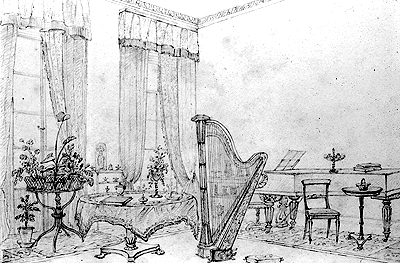
He had not seen me then above twice
In her conduct book, Letters to Young Ladies on their Entrance into the World (1824), Elizabeth Lanfear warns women not to rush into marriage: "love-matches, at least those which are generally so called, do not always prove the happiest ; and, when entered into rashly, or at an early period of life, before either the taste or the judgement are sufficiently matured, mutual disappointment is too frequently the result" (Lanfear, p. 49). Lanfear is stating the possibility that marriage can lead unhappiness and warns women not to rush into marriage. If Colonel Brandon proposed the idea of marriage to Charlotte to Sir John, Charlotte might have needed Lanfear's advice not to jump into marriage so rashly.
to make a ring, with a plait of hair in the centre, very conspicuous on one of his fingers.
“Hair jewelry served as a physical demonstration of internal feelings, similar to the idea of sensibility”
(Absorption in Austen,On Hair Jewelry). The act of a man carrying a woman's lock of hair is a symbol of love between the two lovers. It is an act of affection as the lock of hair can also represent a woman's beauty and virtue. By gifting a lock of hair a woman is in a way promising herself to her lover, and in return the man carries and protects the lock which is his way of symbolizing that her will protect her virtue.

barouche
"A carriage with a half-head behind which can be raised or let down at pleasure, having a seat in front for the driver, and seats inside for two couples to sit facing each other" (OED).
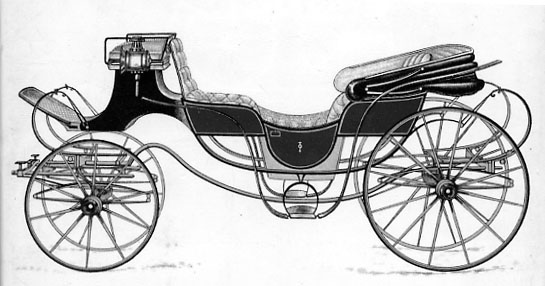
they openly correspond
For a young, unmarried woman such as Marianne to correspond with an unmarried man was considered extremely improper. In fact, for a single woman to initiate such correspondence would be considered scandalous, thereby tarnishing her virtue and reputation as an eligible bridal candidate. Only if they were engaged to each other would this practice be looked upon favorably; in fact, it might be necessary and expected. If they were not engaged, and especially not to each other, open correspondence would indicate a lack of morals in the woman, in that society would assume the young woman to be the man's mistress. Brandon follows this statement by extrapolating that Marianne and Willoughby would soon be married, since that would be the only alternative so her social reputation would not suffer.
the footman
"An attendant or foot servant; one employed to run ahead of or alongside a coach, carriage" (OED).
but I would not go while Mrs. Smith was there, and with no other companion than Mr. Willoughby.”
In the Regency era, it was common for people to visit private homes and estates. There was a "presumption of access to private houses" (Clarke, "A fine house richly furnished: Pemberley and the visiting of country houses") In this discussion, Elinor is chiding Marianne for breaking one of the cardinal rules of visiting a great house: visiting while the family who owned said house was at home. "If the family were away, [a] housekeeper would feel free to show the house to visitors" but "access [could be] refused because the family were at home" (Clarke). By entering Allenham while Mrs. Smith was at home, Marianne has intruded. The fact that she was also alone with Willoughby, a man who is not a relative of hers, with no supervision from others could cause people to question Marianne's virtue.
he has got a lock of her hair.”
"Among family, friends and romantic partners, exchanging a lock of hair was a sign of mutual esteem and deep affection. Upon the death of a loved one, locks of hair were often cut and kept as a way to both honor and remember the dead... [H]air was both an intimately personal souvenir of a specific person and an (almost) everlasting memento." ("Hairwork jewelry" on the Fashion Institute of Design and Merchandising (FIDM) Museum of Los Angeles' blog) Locks of hair were often kept in the form of jewelry, as we see Edward Ferrars wearing later in the novel. Hair jewelry ranged from simpler rings like the one Edward wears to complex necklaces, brooches, and other pieces.
 (Image: "Gold and enamel mourning ring with hair of the deceased under glass, c. 1855." from The Victor Mourning Blog)
(Image: "Gold and enamel mourning ring with hair of the deceased under glass, c. 1855." from The Victor Mourning Blog)
(Image: "Hairwork necklace. 1850-1890. Gift of Andrea Tice. 2008.46.101" from the FIDM Museum Blog)
christian name
The term "Christian name" refers to one's first or given name, which was often given at the time of an infant's baptism (Thurston, Catholic Encyclopedia). An excerpt from Etiquette for Ladies, published in Philadelphia in 1840 by Lea & Blanchard, details some specifics on the use of Christian names in different types of company: "In speaking, it is always proper to give the name of Sir, Madam, or Miss... It is equally good [etiquette], when alone with [one's husband], to designate him by his Christian name." The use of a Christian name, or given name, was incredibly intimate and for the most part only meant to be used by family members in private spaces.
leave his estate from his nephew;
“England was a very patriarchal society. Not only in the public sphere, but also in the private one as well. Women did not have any power in any portion of the nation, whether it be economic, political, or social. In England there was no law written expressly concerning inheritance other than, that the will or desire of the man of the home or estate will be carried out. This meaning that if the man of the estate wished for his nephew to inherit the land it was to be so. The common practice was that a son or nephew to the head of the family was to inherit all of the assets, because he would be more worthy of the property than a woman.” (Davis, Brooke. Inheritance Laws in the Early 1800s in England, Web)
succession to the Norland estate
“Before the nineteenth century, most families were organized according to patriarchal tradition. Household heads owned and controlled the means of production, and their wives and children were obliged to provide the unpaid labor needed to sustain family enterprises. Masters of the household had a legal right to command the obedience of their wives and children—as well as any servants or slaves—and to use corporal punishment to correct disobedience.“ (Ruggles, Steven. Patriarchy, Power, and Pay, Web)
but she knew that this kind of blunder was too common for any sensible man to be lastingly hurt by it
Elizabeth Lanfear describes the repercussions of marriage and the commonality of how marriages occur: “marriage, generally speaking, in either sex, is more frequently the result of accident than of selection : propinquity, convenience, interest, or, at best, mere fancy, dignified by the name of love, forms the basis, of most matrimonial engagements” (Lanfear, Young Ladies on their Entrance into the World, p. 47). Lanfear's statement on marriage relates to this moment where Elinor notes her knowledge of this common type of marriage. In relation to Lanfear's statement, Elinor notices the infatuation between Mr. Palmer and his wife being the main attraction that led to their marriage.
The studied indifference
In her conduct book published in 1824, Elizabeth Lanfear explains the etiquette expected from married women: “a sensible woman, to preserve the peace and secure the affections of her husband, will often sacrifice her own inclinations to his” (Lanfear, Young Ladies on their Entrance into the World, p. 67). Lanfear states that married woman are expected to sacrifice their tendencies and desires for those of her husbands. In regard to the relationship between Charlotte Palmer and her husband, this same etiquette is very strongly illustrated. In this particular moment, Charlotte is being selflessly tolerant to her husband's comments whether or not her husband's actions affect her.
billiard room
A billiard room according to David Selwyn served as a key part of enjoyment towards entertaining guests, "large houses . . . were provided with a billiard room, which, though largely for the enjoyment of the men, could sometimes be an advantage to the ladies: Jane Austen commented that it drew 'all the Gentlemen to it whenever they are within, especially after dinner'" (Selwyn, Jane Austen and Leisure, p. 265). In this context, Austen is depicting the assumption that people with large houses who frequently entertain guests are expected to have a billiard room. 
I gave him a lock of my hair set in a ring
A common way in early nineteenth-century England to exchange sentiments. Also used in the mourning of a loved one.

Then taking a small miniature from her pocket, she added
Portrait miniatures were often given between lovers as a symbol of love or affection, especially if the loved one was absent for long periods of time. (1450 to 1789: Encyclopedia of the Early Modern World, Web)
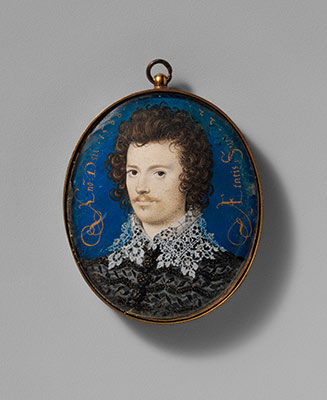
I was very unwilling to enter into it, as you may imagine, without the knowledge and approbation of his mother; but I was too young and loved him too well to be so prudent as I ought to have been
Approbation means the "action of expressing oneself pleased or satisfied with anything; or the mere feeling of such satisfaction; approval expressed or entertained" (OED).
According to the customs of the time, parents were to be consulted about a marriage and their opinion to be taken in high regard; however, men and women were mostly free to choose their marriage partner. If a young adult did choose someone who their parents disliked, they might be left out of the will or, if they are underaged, they may have permission withheld from them. Parental opinions were often respected by young people. ( Elizabeth Maurer, "Courtship and Marriage in the Eighteenth Century", Web.)
she had now therefore nothing to do but marry all the rest of the world
“The choice of a spouse was not solely left up to the suitors. Parents and even the wider community had an interest in securing suitable matches, between men and women of similar status, wealth, and age, and they exerted pressure accordingly“ ( Robert B. Shoemaker, Gender in English Society 1650-1850: The Emergence of Separate Spheres, p. 93 )
Because you are so sly about it yourself, you think nobody else has any senses; but it is no such thing, I can tell you, for it has been known all over town this ever so long. I tell everybody of it and so does Charlotte.”
Example of how gossip plays a big role in society. Gossip is how information goes around and status can go up and down.
When they had paid their tribute of politeness by curtesying to the lady of the house
This was also custom and simple manners when attending a party. It is offensive if this action was dismissed. It is a way of introducing oneself to the host/hostess and showing gratitude for the invitation.
ascended the stairs, heard their names announced from one landing-place to another in an audible voice, and entered a room splendidly lit up
During this time, the purpose of this was just so that your presence was known and acknowledged. This is custom.
It was all pride, pride, insufferable haughtiness and pride!
In The Lady's Guide to Perfect Gentility from 1857, "Pride" is listed as one of the most hateful dispositions and the reserve that Eleanor and Henry Tilney display in the company of their father is explained by the Guide's author as the means to many a misunderstanding and accidental affronts. (Thornwell, Emily. The Lady's Guide to Perfect Gentility, 1957.)
the pump–room
A meeting place for upper-class people. Mrs. Allen's favorite place was situated closed to the main entrance of the Roman Baths. It is well-known for the power of its waters. The place is still popular today at tea time thanks to its restaurant ("Jane Austen World").

she drew back her hand;
These small subtleties and flirtatious hints were very popular, and at times, imperative to catch your fish. They were, however regimented and formulaic. 
new straw bonnet
Most likely in reference to one of the top ones; because it is worn by Catherine, which is indicative of youth. Whereas someone older like Mrs. Thorpe, or Mrs. Allen, would be seen wearing one of the bonnets towards the bottom, befitting their maturity.
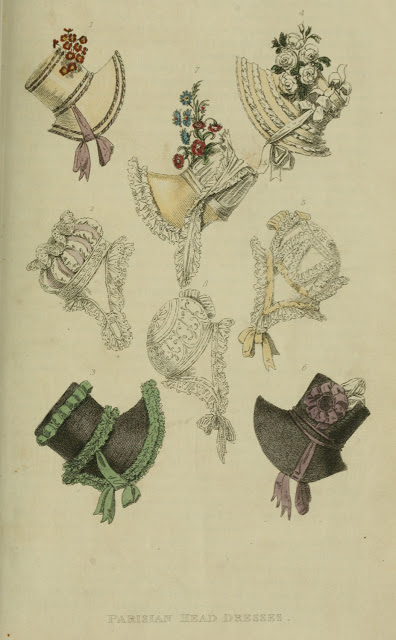
to be introduced to her
"To make known in person, esp. in a formal manner, with announcement of name, title, or other identification" (OED).
cravats
Fabric or material, often made of muslin with lace at the end, worn around the neck as fashion" (OED).
The master of the ceremonies introduced to her a very gentlemanlike young man as a partner
The master of ceremonies was an official position in fashionable towns like Bath. Their job was to oversee the balls and parties. Their duties spanned from enforcing the rules and keeping the peace to making sure everybody was dressed correctly. As we see in this line, one of their most important jobs was to introduce young men and women (Austenonly, "The Master of Ceremonies: The Georgian Assembly Room, Part Four", https://austenonly.com/2013/02/28/the-master-of-ceremonies-the-georgian-assembly-room-part-four/ ).
There goes a strange–looking woman! What an odd gown she has got on! How old–fashioned it is! Look at the back.”
In response to the French Revolution, by the late 18th century, constricting, formal styles of dress, reminiscent of French aristocracy went out of fashion. Instead, looser styles of dress, inspired by classical Greek and Roman fashions, rose in popularity. Lightweight, sheerer materials, such as muslin were popular, as was an empire style waistline ("Lord Scott", An Introduction to Ladies' Fashions of the Regency Era, http://www.wemakehistory.com/Fashion/Regency/RegencyLadies/RegencyLadies.htm ).
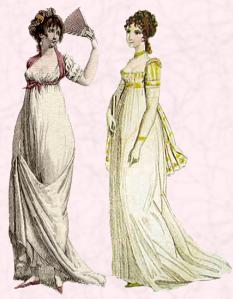
she longed to dance, but she had not an acquaintance in the room
During this period in England, men and women could not interact, much less dance together, unless they were formally introduced by somebody that they were both acquainted with (Maria Grace, The High Stakes of Etiquette for Young Ladies in the Regency, https://kimrendfeld.wordpress.com/2013/04/29/the-high-stakes-of-etiquette-for-young-ladies-in-the-regency/ ).
pelisse
"A woman's long cloak, with armhole slits and a shoulder cape or hood, often made of a rich fabric; (later also) a long fitted coat of similar style" (OED).
The very curtains of her bed
In this time, curtains would be hung around four-poster beds in order to help prevent drafts and keep occupants warm (Jane Austen's World, Vic, "Ways to Keep Warm in the Regency Era, Part 2").
a letter
"[...] letters were written on sheet[s] of paper that were folded and sealed [...] Envelopes were not used" (Jane Austen's World, Vic, "Letter Writing in Jane Austen’s Time").
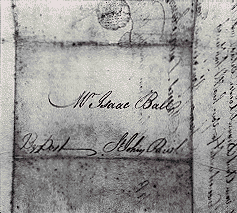
habit
"Bodily apparel or attire; clothing, raiment, dress" (OED). Here, it most likely refers to a riding habit, which was worn by women when riding a horse. The riding habit had also become fashionable to wear while traveling (Jane Austen's World, Vic, "Women’s Riding Outfits in the Early 18th Century").
scullery
“A small room attached to a kitchen, in which the washing of dishes and other dirty work is done” (OED).


Captain
"Originally Captain-Lieutenant, becoming Captain in 1772. Lat. capitaneus "chieftain", from Lat. caput "head". Chieftain or head of a unit. As armies evolved his post came to be at the head of a company, which by the Sixteenth Century was usually 100 to 200 men. That seemed to be the number one man could manage in battle" (Harding, British Army Ranks).
muff
"A covering, often of fur and usually of cylindrical shape with open ends, into which both hands may be placed for warmth. Now chiefly hist" (OED)
.
tippet
"A long narrow slip of cloth or hanging part of dress, formerly worn, either attached to and forming part of the hood, head-dress, or sleeve, or loose, as a scarf or the like" (OED).
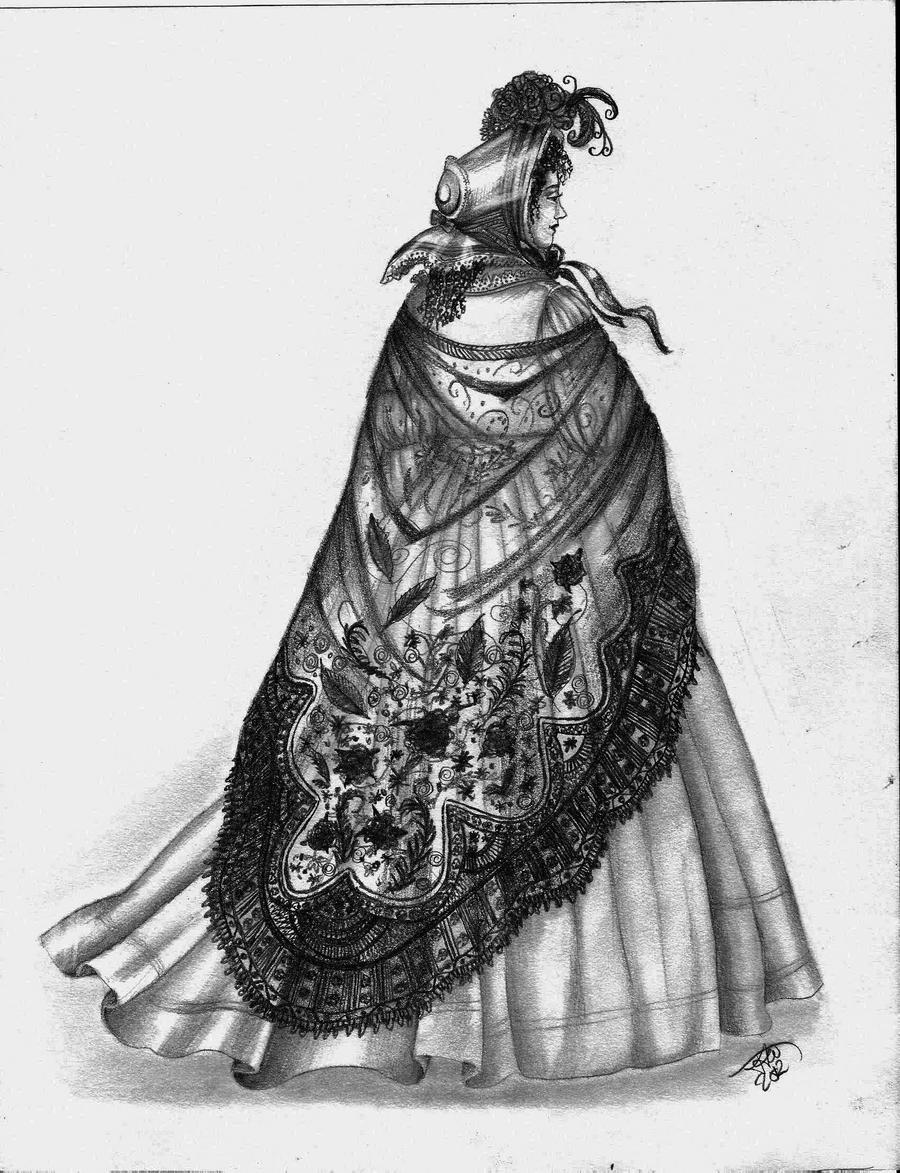
uncoquettish
"Coquette: a woman (more or less young), who uses arts to gain the admiration and affection of men, merely for the gratification of vanity or from a desire of conquest, and without any intention of responding to the feelings aroused; a woman who habitually trifles with the affections of men; a flirt" (OED).
pump–room

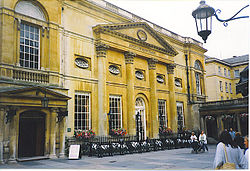 The Grand Pump-Room at Bath was considered a social meeting place for the upper class (Grand Pump Room, Bath, wiki).
The Grand Pump-Room at Bath was considered a social meeting place for the upper class (Grand Pump Room, Bath, wiki).
“Rest! He has only come three and twenty miles today; all nonsense; nothing ruins horses so much as rest; nothing knocks them up so soon. No, no; I shall exercise mine at the average of four hours every day while I am here.”
"The life of a stage coach horse during the Regency era was not easy. Roads, though much improved over previous centuries, could be filled with mud and ruts that impeded progress. Generally one horse could pull a wheeled vehicle six times its own weight. Therefore, a carriage horse weighing from 1200 lbs to 2300 lbs is able to pull from 7200 lbs to 13,800 lbs. Multiply this number by four or six, and you have team that can pull a substantially sized vehicle. However, tired horses had to be replaced about every ten miles or so, and “the average life of a horse pulling a coach at about eight mile per hour was six years; at ten miles per hour or over, possible on good roads, a horse lasted three years" (The Prince of Pleasure, J.B. Priestley, 151-152).
Did not we agree together to take a drive this morning?
“Do not accept an invitation to visit any place of public amusement, with a gentleman with whom you are but slightly acquainted, unless there is another lady also invited. You may, as a young lady, go with a relative or your fiancée, without a chaperon, but not otherwise” (Florence Hartley, The Ladies' Book of Etiquette, and Manual of Politeness, 173).
Going to One Wedding Brings on Another?
There is no evidence for a song with this title existing. During the Georgian period wedding hymns were often sung at parties that were not weddings, just for fun. However, the lyrics for this particular hymn does not exist. Austenites speculate that the author invented this title as an excuse for John Thorpe to suggest marriage to Catherine (ODP).
They must think it so strange, so rude of me! To go by them, too, without saying a word!
At this point in the novel, Catherine is practically coerced into accompanying John Thorpe, Isabella, and her brother James in travelling to Bristol, taking John’s word of having already seen the Tilney’s leaving town earlier that morning. As they’re leaving, they spot the Tilney’s on their way to their planned engagement with Catherine. Catherine pleads for John to turn back and he ignores her, in which she replies to him with this quote. Pertaining to the social customs of the time, “A lady should never "cut" someone, that is to say, fail to acknowledge their presence after encountering them socially, unless it is absolutely necessary (Daniel Pool, What Jane Austen Ate and Charles Dickens Knew, 55). At face value, it appears that Catherine has slighted her dear acquaintances by ignoring them.
sprigged muslin
"Any of various lightweight cotton fabrics in plain weave. Also: a piece of such fabric; a dress or other article of clothing made of muslin" (OED).
From the 17th century to the late 18th century, muslin fabric was mostly imported from places like India. The fabric was used for dresses and curtains and was notably well liked for its simplicity; its ability to drape beautifully; and for the fabric's ability to take paint, dyes, and embroidery very well. Muslins were mostly worn by gentility in the color white. The color white was used to signify the gentility's wealthy lifestyle because white garments were harder to keep clean and were very expensive to constantly have laundered to maintain the pure white color. (Jane Austen’s World)
Here is an example of a sprigged muslin which is named for the muslin's unique design which resembles sprigs of leaves or flowers all over the dress: 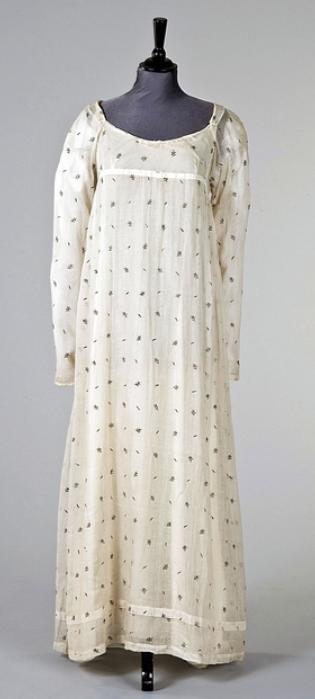
post–masters
"A person with official charge of post. The official at each of the stations or stages of a post-road; primary duty to carry mail to the next state" (OED).
honours of her house
"The duties of house." As the only female family in residence at Northanger Abbey, Miss Tilney would be expected to act as the hostess.
This duty would normally be performed by the wife of the household, and in her absence, the eldest daughter or at times, the sister of the host.